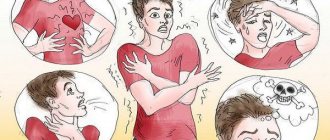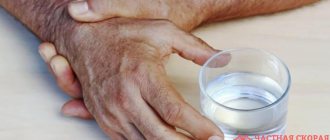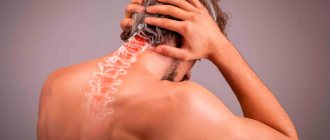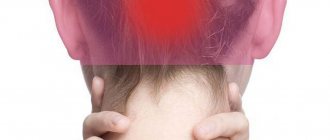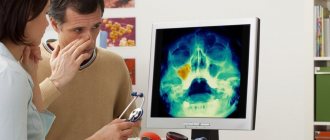The birth of a baby is always a joy for young parents. Naturally, all the attention of the mother and father is focused on the child. They can't get enough of how well he eats, sleeps and smiles back at them.
- Causes of lower lip tremor in babies
- Complications and consequences of tremor
- What measures should be taken if a baby’s lower lip is shaking?
But when the baby starts crying and the parents notice their lips trembling, they become alarmed. Therefore, we will look at why a newborn’s lower lip is shaking.
Causes of lower lip tremor in babies
Often mothers notice that their child’s lower lip shakes when the baby is at rest. And here the parents begin to panic. The thought immediately pops into their head that their little one is seriously ill with something.
Tremor is a shaking associated with involuntary contraction of the mental, triangular and quadratus muscles of the lower lip. Now let's look at the reasons for the formation of tremors from the norm and pathology.
- Response to stimuli (cold, stress, loud sound, sudden influx of bright light).
- When a newborn is stressed, an uncontrolled amount of norepinephrine is released from the adrenal cortex, which enters the bloodstream. NA causes vasospasm and contraction of smooth muscle tissue.
- An underdeveloped central nervous system is unable to regulate the baby's movements.
Among the stressful situations why a newborn's lower lip shakes, one can highlight: bathing, intestinal colic (pain), the moment of changing clothes, a state of hunger, and ordinary fatigue.
- Involuntary muscle contraction at rest.
- Joint trembling of the chin and lower lip, limbs, head.
- Frequently recurring tremors.
- After three months of age, trembling becomes more frequent.
The causes of pathological tremor are:
- prematurity (in premature children, trembling is observed up to 1.5-2 years);
- stress during pregnancy;
- developmental disorder of the peripheral nervous system (PNS);
- increased ICP (intracranial pressure);
- increased blood sugar in a newborn;
- maternal diabetes mellitus or impaired glucose tolerance during pregnancy;
- birth trauma (long, protracted labor; injury received when the head passes through the birth canal);
- Polyhydramnios, infections during pregnancy and a deficiency of essential microelements and vitamins (in particular Mg and B vitamins) can cause disruption in the development of the central nervous system (hereinafter referred to as the CNS) of the fetus.
Problem prevention and prognosis
To prevent lips from starting to twitch, there are certain preventive measures: ensure proper rest, learn to cope with stress, improve nutrition, walk in the fresh air, ventilate the room. If your muscles are twitching, you can perfectly relax with the help of an aroma bath or massage.
It is recommended to limit watching TV and being in front of a computer screen, especially before bed. Do not eat protein foods at night. The recommendations listed apply to both adults and children. Moreover, for children, being in front of a computer and TV should be strictly regulated, depending on their age category. Also, do not ignore any alarming symptoms. It is better to visit a doctor and rule out possible dangerous diseases. Most often, the doctor does not even resort to prescribing medications. A course of multivitamins, relaxing massage, physiotherapeutic procedures, and psychotherapy is sufficient.
Chief author and editor-in-chief: Makarskaya S.E., 29 years of experience.
Last revision: 03/18/2018
Complications and consequences of tremor
Physiological tremor does not pose any danger to the health of an infant. After 3-4 months after birth, trembling of the chin and lower lip disappears and no longer bothers either the child or his parents.
As for pathological tremor, here things are much more complicated. Prolonged and frequently recurring tremor is the first alarm bell indicating neuropathy. Involuntary contraction of the muscles of the chin, lips, upper and lower extremities, and head may indicate the presence of perinatal encephalopathy in the baby.
This pathology may include various disorders of the central nervous system that arise as a result of intrauterine development. If you consult a doctor in a timely manner, the disease can still be treated.
If the tremor of the lips and chin is not caused by neurology, then it is necessary to undergo a set of examinations to determine whether there is a deficiency of Ca and Mg in the baby’s body, and diabetes mellitus.
Nervous tic of the upper lip
Why does my upper lip twitch? Most often these are disturbances in the functioning of the trigeminal nerve. The reasons why the upper lip twitches include:
- Hypothermia and prolonged exposure to a draft can cause cramps and muscle numbness.
- Nervous diseases, in particular Parkinson's disease, are accompanied by shaking of the entire right or left side.
- Facial injuries and traumatic brain injury.
- Genetic predisposition.
- This may also be the result of undergoing certain cosmetic procedures (injections of anti-aging drugs - Botox, hyaluronic acid, fillers; lip augmentation).
- Dental surgeries or procedures.
- In an infant, this condition can be triggered by a previous vaccination.
With frequent muscle twitching, you can suspect certain psychological problems caused by stress and emotional fatigue. It may also be an initial symptom of a developing nervous disease. You should consult a specialist if the pulsation is accompanied by other symptoms, if this condition causes severe discomfort or persists for a long time.
In winter, this condition may indicate a malfunction of the body. During attacks by viral agents, with the development of conjunctivitis, blepharitis, such a symptom is not uncommon. In case of disorders of the nervous structure, the causes may be sleeping at night in an uncomfortable position, poor lifestyle, in particular, poor nutrition (when the diet lacks a large amount of vitamins and minerals).
You can determine exactly what caused the damage to the branches of the trigeminal nerve by visiting a neurologist.
What measures should be taken if a baby’s lower lip is shaking?
Above we discussed why a newborn’s lower lip shakes. Now let’s look at how parents should act in such a situation. When a pathological tremor has been identified in an infant, a neurologist will treat it.
When an infant’s lower lip and chin shake under stress, you need to do the following:
- Do not panic and do not jump near the baby shouting “Oh!” and “Ay!” The baby needs to create a cozy and comfortable environment. Better yet, kiss the little one!
- Get rid of the cause of stress (turn off the music, turn off too bright lights).
- If you have the opportunity to breastfeed your baby, then you need to continue in the same spirit. No mixtures!
- Control your sleep patterns. Feeding, sleeping, and waking the child should take place at the scheduled time.
- Walk with your baby in the fresh air for at least 3 hours.
- Pay attention to the baby's clothing. It should not allow the child to overheat.
- Feel free to harden your baby by wiping him with a towel.
- Massage.
After visiting a neurologist, you may be prescribed a relaxing massage and sea salt baths. The massage procedure can be carried out either in a clinic with a massage therapist or at home.
The massage itself should not last more than 10 minutes.
Knowing all this, you shouldn't panic. If you are concerned about tremor of the baby's lower lip, contact your local pediatrician, who will prescribe an examination if necessary.
www.preobrazhenie.ru - Transfiguration Clinic - anonymous consultations, diagnosis and treatment of diseases of higher nervous activity.
- If you have questions for the consultant, ask him via a personal message or use the “ask a question” form on the pages of our website.
You can also contact us by phone:
- 8 495-632-00-65 Multichannel
- 8 800-200-01-09 Calls within Russia are free
Your question will not remain unanswered!
We were the first and remain the best!
CREATE NEW MESSAGE.
But you are an unauthorized user.
If you have registered previously, then “log in” (login form in the upper right part of the site). If this is your first time here, please register.
If you register, you will be able to further track responses to your messages and continue the dialogue on interesting topics with other users and consultants. In addition, registration will allow you to conduct private correspondence with consultants and other users of the site.
Any unusual behavior of a baby frightens young parents. When a newborn's lower lip trembles, they may panic. After all, he is so small and vulnerable. How to understand what is happening to him? The first thought that appears is that the child is cold. The mother takes the child in her arms and tries to warm him up. In the mother's arms, the baby often calms down, and his lips stop trembling. But there are times when a baby’s chin shakes in a warm room and in the mother’s arms. It is difficult for parents to find an explanation for this. This means that something is wrong with the baby and he is sick. Is this condition a sign of a disease?
Treatment
It should be understood that if an adult or child begins to systematically shake one or both lips, then it is better to immediately consult a doctor and not try to self-medicate, wasting time.
The reasons may be harmless, or they may lie in a very serious illness.
When the doctor makes an accurate diagnosis, he will prescribe appropriate treatment. Based on why your lower lip (or upper lip) is shaking, the following treatment options are possible:
- Prescribing sedative drugs to calm the nervous system. This includes Novopassit, Adaptol, and valerian tincture. You can also prepare tea with chamomile, lemon balm or motherwort at home.
- If the reason is excessive tension, excess stress, then a relaxing massage, aromatherapy, relaxing bath, and breathing exercises will come to the rescue.
- If a lack of vitamins or certain microelements is detected, in particular potassium and magnesium, the doctor will prescribe a complex of vitamins or preparations with the missing microelements. The doctor may also recommend making changes to your usual diet, enriching it with foods high in the missing components.
- If you abuse alcohol, the best recommendation is to get rid of the bad habit. If it is impossible to overcome this addiction on your own, your family doctor may refer you to a narcologist.
- Antidepressants may be prescribed in particularly severe cases, especially if there is a depressive disorder.
- In the case of a traumatic brain injury, medications are prescribed to restore cerebral circulation.
- If you have a computer addiction, you will receive recommendations on how to get rid of such addiction, because prolonged sitting in front of a monitor can also affect the nervous system, and you may notice that the lower lip (less often the upper) is shaking.
- The doctor may also advise changing your daily routine, normalizing the process of sleep and rest, since it is often the lack of sleep that can affect the appearance of lip tremor.
- Relaxing massage, relaxation exercises. They are also an excellent way to eliminate lip tremors.
Groups of medications used for lip tics
So, we found out why the upper lip twitches. What drugs are commonly used to get rid of this unpleasant problem?
- Antidepressants and tranquilizers. They are sold by prescription and can be prescribed by a neurologist or psychiatrist. They level out the psycho-emotional state, help improve performance, normalize sleep, and restore the normal balance of neurotransmitters (serotonin, norepinephrine, etc.).
- Mild over-the-counter sedatives, the use of which does not cause addiction and has virtually no side effects. But the effect of taking such medications is less pronounced than that of prescription antidepressants and tranquilizers.
- Drugs that restore cerebral circulation. Effective if the cause of the tic is traumatic brain injury.
- Vitamin-mineral complexes will help get rid of the deficiency of minerals and vitamins, as well as the consequences of a lack of these elements.
- Herbal sedatives. The cheapest way to normalize sleep and become calmer, which will entail a decrease in the severity of nervous tics on the face. However, in some cases, taking herbal infusions is completely useless.
If your lip twitches due to nervousness, in most cases you can get rid of the problem naturally by making some positive changes to your lifestyle.
Proper eating behavior, getting rid of stress, maintaining a routine, normalizing sleep and moderate exercise will not only reduce episodes of tremors and muscle tics, but will also help you feel healthier and younger.
If you find an error, please select a piece of text and press Ctrl+Enter. Thank you for your attentiveness and help!
Physiological causes of chin tremors in infants
Trembling (tremor) of the chin is often observed in very tiny children. Typically, a newborn's lower lip will quiver when he is excited, cries a lot, is very upset, or is in pain. At this moment, his arms or legs may also tremble.
The cause of this condition is usually the imperfection of the baby’s nervous and endocrine systems. When he is scared or angry, his adrenal glands produce stress hormones - adrenaline and norepinephrine. The baby’s adrenal glands have not yet adjusted their work, so more hormones are produced than necessary. Excess hormones literally burn the baby's muscles, causing them to contract. But this condition passes quickly enough as soon as the baby calms down. Therefore, the tremor often disappears after the mother takes the child in her arms. The baby is calmed by contact with his mother's body.
Most children develop trembling of the chin or lips in the first months of life. It is considered normal for tremors to appear after prolonged crying, physical activity or emotional overexcitation. A baby may become overexcited after playing for a long time or due to a prolonged lack of sleep.
But why does a newborn's lip tremble when he is calm?
How does it manifest itself?
A nervous tic is manifested by pulsating or twitching of a certain part of the upper or lower lip. Adults feel twitching of the lower lip or pulsation. Children cannot yet explain their condition. Usually, when pulsation is felt, the baby twists his mouth and may pull his chin. Children may grimace when talking. All these manifestations do not go unnoticed. If they are short-term, this is the norm.
Muscle hypertonicity
Sometimes a baby's shaky chin appears even when he is calm. The cause of this phenomenon may be muscle hypertonicity. This is a limitation of the voluntary motor function of the infant, caused by certain disorders in the development of the brain and peripheral nerve. With hypertonicity, the baby's muscles are overstrained. They remain tense even when the baby is in a relaxed state.
Other signs of hypertonicity are poor quality sleep (the baby sleeps little and poorly), increased irritability, frequent regurgitation after feeding, throwing back the head and unnatural arching of the body.
If you suspect hypertonicity, you can conduct an experiment. You need to take the baby under the armpits and place him on a hard surface, slightly tilting him forward. In this position, babies begin to instinctively move their legs, as when walking. A baby with hypertonicity will stand on his toes, while a healthy baby will stand on his entire foot. This is a classic diagnostic sign of hypertension and dysfunction of the nervous system.
What can you do at home?
If your lip or tip of your mouth twitches, you can perform a self-massage - massage your forehead, temples, wings of the nose, earlobes, and neck. Relax, relax, or take an aromatic bath. Drink tea from lemon balm, mint, thyme and motherwort. If this condition occurs in a child, it is recommended to take the following measures:
- distract the child (but not with a computer or TV);
- do not focus the baby’s attention on this symptom;
- protect from stress;
- establish proper sleep;
- visit a doctor.
Other reasons
Muscle tremors often accompany in the first months of life those babies who suffered from oxygen starvation in the womb.
Oxygen starvation of the fetus is called hypoxia. It occurs when placental abruption, entanglement with the umbilical cord, in the event of a threat of miscarriage, or due to other disorders of placental blood flow. Fetal hypoxia can be caused by infectious diseases, polyhydramnios, or bleeding. Lack of oxygen affects brain development and causes tremors in children.
Chin trembling often affects children whose mothers were in a state of nervous tension during pregnancy. During pregnancy, a woman's body produces a lot of stress hormones. They penetrated the placenta and entered the baby’s blood. Maternal stress hormones could cause disturbances in the functioning of the child’s nervous and endocrine systems.
When should tremors be treated?
As a rule, lip trembling in most children goes away on its own by the age of three months. If at 3 months the baby continues to suffer from tremors, he may have developmental pathologies. A particularly alarming sign is tremor of the limbs and head, which does not weaken over time, but even intensifies. This indicates a clear neurological disorder.
This condition may indicate that the child has hypocalcemia, hyperglycemia, hypomagnesemia, sepsis, intracranial hemorrhage, or increased intracranial pressure. Therefore, the baby urgently needs to be shown to a neurologist.
It is also recommended to consult a neurologist if there is a suspicion of hypertension in the baby.
In addition to drug treatment, the doctor will prescribe therapeutic exercises and massage. Swimming is very beneficial for all children with tremors and other manifestations of nervous disorders. You can visit the baby pool or organize swims at home in the bathroom. Such procedures have an excellent effect on the baby’s nervous system and muscle tone. At home, you need to create a comfortable, calm and peaceful environment for your child.
Diagnosis in children
A pediatric neurologist is involved in examination and treatment. You need to contact him in the following cases:
- if the lip twitches very strongly;
- with multiple tics;
- in the presence of physical discomfort due to a nervous tic;
- in case of violations of social adaptation against the background of a similar condition;
- if this condition has been present for more than one month.
At the appointment, the doctor collects anamnestic data, collects information about when the problem appeared, what preceded such a symptom, whether there are injuries or diseases, whether anyone in the family has a similar condition.
In addition to conducting an external examination, the specialist prescribes instrumental and laboratory diagnostic measures: a general blood test, ionogram, test for helminthiasis, magnetic resonance imaging, electroencephalography.
